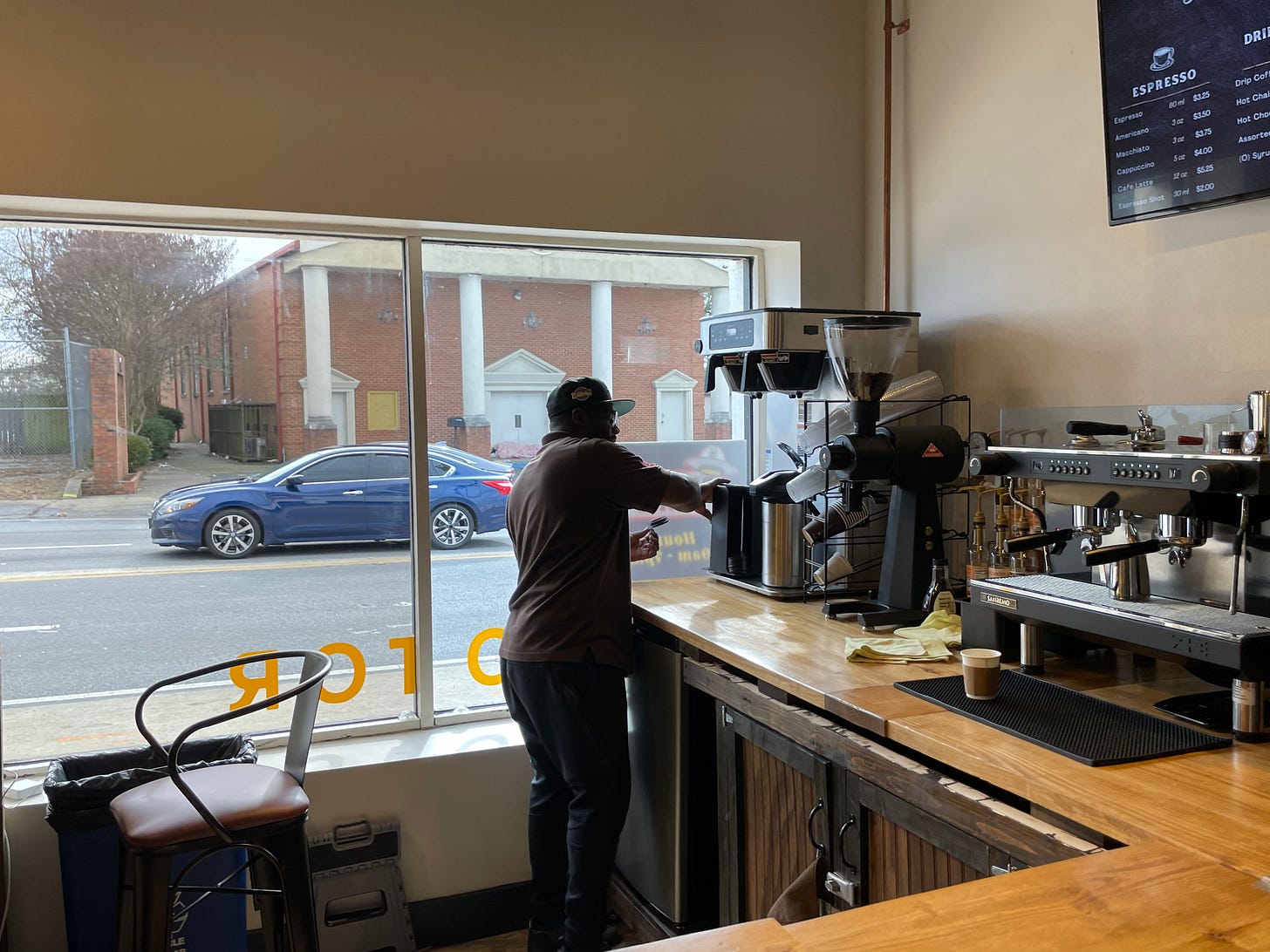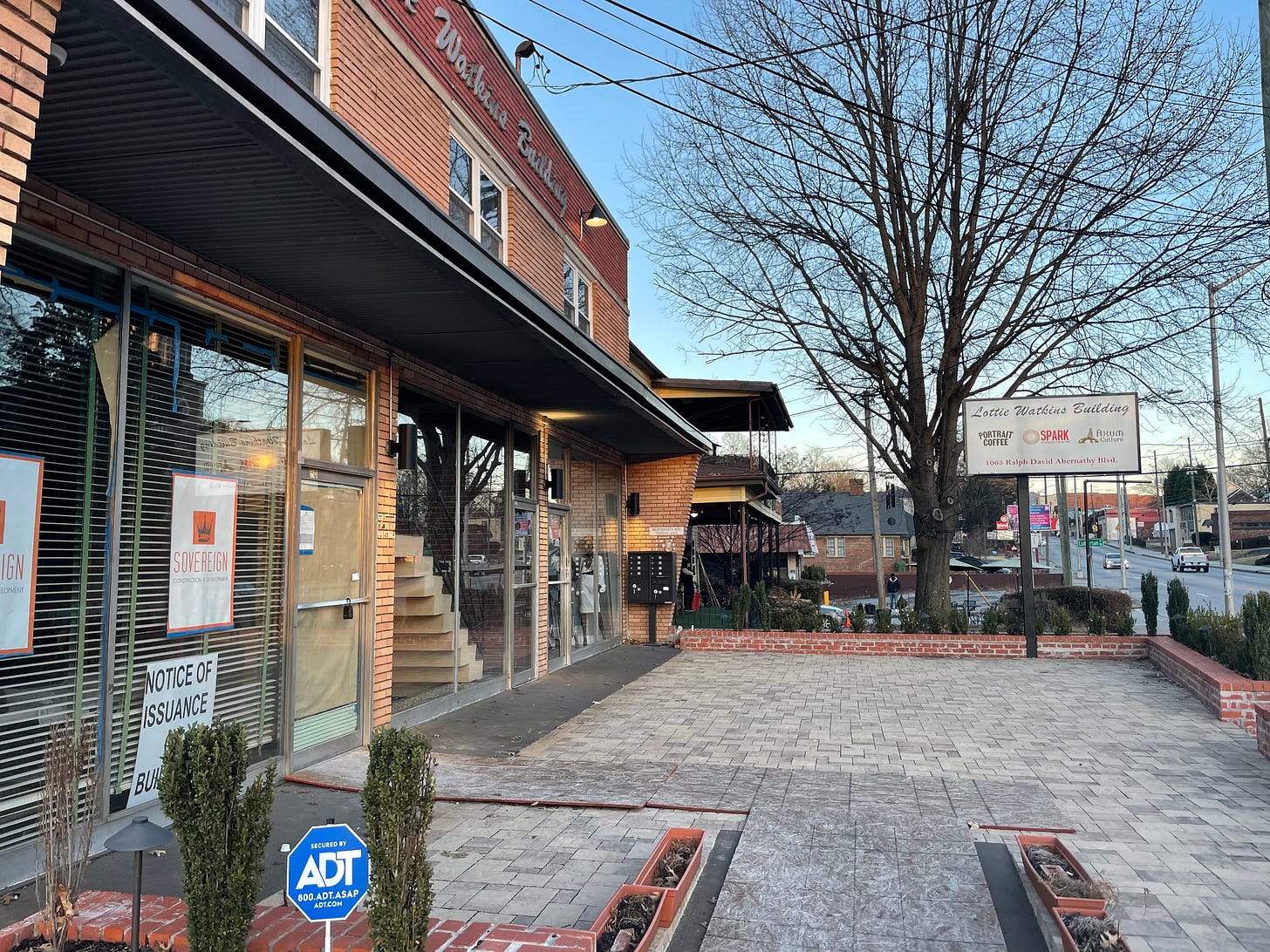Welcome to my freemium newsletter by me, King Williams. A documentary filmmaker, journalist, podcast host, and author based in Atlanta, Georgia. This is a newsletter covering the hidden connections of Atlanta to everything else.
This is a continuation of my collaboration with The Atlanta Voice, ‘The 10 best Black-owned coffee shops in metro Atlanta’. I would suggest you read that piece as well as this one.
The Atlanta Voice asked me to rank the best Black-owned coffee shops in metro Atlanta
I recently collaborated with The Atlanta Voice, the oldest continually operating Black-owned newspaper in Atlanta, for a look at the plethora of Black-owned coffee shops in the metro area. This included going on a local tour of Black-owned coffee shops.
In this collaboration, I ranked the 25 best Black-owned coffee shops in the metro area. I graded these shops on a few criteria—location, customer service, drink, quality, experience, staff, knowledge, if applicable, food, pairings, and programming.
Atlanta is a coffee town, seriously
Atlanta is known for many things, but coffee has traditionally not been one of them, until now. Over the last few years, a series of new and veteran entrepreneurs, baristas, mixologists, shop owners, and roasters are redefining the world of coffee each day.
Atlanta is home to Marvin Duncan, an internationally renowned mixologist, who has placed second in the 2021 coffee contest. Alongside Jake King, another nationally competitive mixologist and coffee aficionado who has also started his own coffee consulting firm GYST.
From Gen X to Gen Z, coffee is a way of life, creating a patchwork of innovation, unlike anything in America. With Black Atlantans of all walks leading the way, it's time to start thinking of Atlanta as the Black Mecca of coffee. Here are a few things to notice when delving into this still evolving Black coffee scene.
1. There are places serving traditional African coffee
Metro Atlanta has several restaurants serving traditional east African coffee. Coffee’s cultivation started in Ethiopia centuries ago, before its migration into the middle east and eventually Europe before spreading across the world into the beverage that it is known as today. Luckily for those in the metro area, there is no shortage of places, to have traditional Ethiopian-served coffee.
Most venues are located in DeKalb County within Clarkston, a heavily immigrant section of the county, as well as Brookhaven and North Decatur. Two of the best venues, Desta Ethiopian Kitchen in Brookhaven and Lambadina Cafe in Clarkston offer an original coffee experience at a relatively affordable price point. While Abyssinia, Embilta Ethiopian Cafe & Restaurant, and Bole Ethiopian Restaurant are also all fine choices as well. None of these locations are traditional sit-down coffee shops but are restaurants, offering traditional Ethiopian food alongside their coffee service.
2. Castleberry Hill is becoming the epicenter of the Atlanta Black coffee movement
Castleberry Hill is quickly becoming the epicenter of the Black coffee movement. The area features several shops already open such as Coffee & Eggs (#7 on the list), Black Coffee–Castleberry Hill (#8), Brooklyn Tea (#9), and nearby Rosie’s Cafe (#20) on Northside Drive. This is before the highly anticipated second location of Gilly Brew Bar (#1) opens this year at renowned artist Miya Bailey’s Peter’s Street Station.
Castleberry Hills is sitting in the middle of a commercial gold rush
Castleberry is still buzzing with real estate development in the area and a red-hot westside market next door. These coffee shops are centrally located near the biggest economic development project in Georgia's commercial real estate history at Centennial Yards. Centennial Yards (formerly known as The Gulch) is a massive, $5.1 billion dollar mini-city project, that will see dozens of new office buildings, retail, and thousands of new residents located directly across from Castleberry Hill, Mercedes Benz Stadium, and State Farm Arena. The project should be mostly online by the start of the 2026 World Cup, potentially opening all of these Black shops to a once-in-a-lifetime opportunity.
Add in the Hard Rock Revue hotel in the northeast section and the soon-to-be-in-development megaproject, Forge Atlanta, located in the southeastern section of Castleberry Hill. This is alongside several key renovation projects just outside of the boundaries of Castleberry Hill at the renovated Norfolk Southern building, as well as Newport’s 222 Mitchell Street, Hotel Row, and the massive South Downtown redevelopment project. And these all pale in comparison to the upcoming Centennial Yards project.
3. Black coffee shops are navigating the space of gentrification
While coffee shops have been synonymous with gentrification, especially in changing neighborhoods. This generation of Black-owned coffee proprietors in Atlanta is more aware of what is happening while actively trying to be better neighbors than in years prior. This includes a new shop, 404 Grounds at The Ke’nekt Cooperative in nearby Westview. The Ke’nekt Cooperative is a Black-owned mercantile establishment located in the heart of a gentrifying section of the Westside of Atlanta, with the explicit goal of incubating successful Black-owned businesses.
One to watch: Bankhead Coffee/Love Hot Coffee
Operating as a prime case study of the intersection of gentrification, Black ownership, and trendy new establishments in Atlanta is Bankhead Coffee. Sitting at the uber-busy corner of Donald Lee Hollowell Blvd (aka Bankhead Hwy) and Northside Drive. Bankhead Coffee is the first brick-and-mortar location of the Black-owned coffee brand Hot Coffee, colloquially known as Love Hot Coffee.
The decision to have Love Hot Coffee’s first brick-and-mortar location named Bankhead Coffee versus its more colloquial name was intentional, the naming is a direct move to address what ‘Bankhead’ means to a certain generation of Atlantans. While also seeking to not be a part of the erasure of Atlanta's own Black history as the area’s slow change into the real estate creation of ‘West Midtown’ has created an opportunity to rewrite and write out this section of history from Atlanta’s memory. It is a history that often intersects with Atlanta’s Black history, poverty, race relations, and its history of hip hop.
Located in the Westside Motor Lodge, the retail-facing portion of the anchoring Echo Street West development. Bankhead Coffee, opened a few weeks back and is still fleshing out its interior designs, but is working on honoring the spirit of Bankhead, hip hop, and Black Atlanta. This includes the company's plans on erecting a spaceship on the outside of the building to help mark its presence in the neighborhood. For those new to Atlanta, the alien is a reference to the 2005 rap song ‘Scotty’ by Bankhead rap group D4L, a Black Atlanta rap staple for years. Since that time, ‘spaceships on Bankhead’ has been an enduring local moniker.
The company was founded by Katerina Taylor and her business partner Brad Hill in 2020, the coffee shop opened only a few weeks ago. Taylor has had previous experience as the CEO of the DeKalb County Chamber of Commerce and served in the administration of Mayor Keshia Lance Bottoms before starting out to venture on her own in 2020. Hill moved to Atlanta over twenty years ago to attend Morris Brown College, which upon his arrival lost its accreditation, sending Hill into a journey that’s kept him in Atlanta, helping to develop his entrepreneurial might in the process. The two are moving aggressively as they plan to open a second location at an undisclosed location soon.
4. Two women are leading the Black roasters movement
Miriam ‘Mir’ Marshall and Kay Scott are two of the roasters behind some of the best up-and-coming coffee brands in the city.
Both Marshall and Scott are also owners of their own separate direct-to-consumer coffee packaged goods companies. Marshall is the owner of Verb Coffee, a traditional coffee brand specializing in its original roasts. Scott is the owner of Color Cold Brew Coffee, a plant-based bottled beverage product line. The two are working on opening up the site for consumer-facing events in 2023, so it can be expected to grow in prominence soon. The two are also co-owners in the roasting venue Coffee @ The R in Castleberry Hill.
The site specializes in providing roasting and cold brew services for other coffee houses in the city. The two have found a niche for those looking to start a coffee company but lack the equipment, roasting knowledge, and/or expertise to train baristas. The duo occasionally hosts cupping sessions, where the two train anyone who registers, on the differences in coffee bean flavors, textures, and types of coffee.
Their roasting site is also the roasting site for local favorite Ebrik Coffee in Decatur. As well as up-and-coming local DTC coffee brands Tan Brown Coffee and Third Culture Coffee Company. Scott is also the roaster of Portrait Coffee, one of Atlanta’s signature new brands.
5. Portrait Coffee may be the first true national Black coffee brand
Portrait Coffee is on the cusp of being Atlanta’s next big (and maybe) national brand. Portrait Coffee was founded in 2020 by John Onwuchekwa, Marcus Hollinger, and Aaron Fender. The trio was aided by a successful Kickstarter that same year, leading to a pivot to being a direct-to-consumer coffee company.
After an unsuccessful attempt to open their own store with their Kickstarter funds, the trio decided to purchase equipment and brew their own coffee, in the process of creating a direct-to-consumer business that is built for the Internet age. Utilizing a hypebeast-like strategy for coffee, emphasizing limited flavors, special releases, drops, and collaborations, on top of a monthly subscription service. This has worked to tremendous effect.
Since the summer of 2020, the coffee company has become synonymous with being the new standard in Atlanta’s rapidly changing coffee scene for those with hopes of reaching outside of their zip code. Now after three years, their highly anticipated brick-and-mortar shop will be opening soon in the West End. Portrait Coffee is soon to open its first brick-and-mortar store in the Lottie Watkins building, a few steps away from Tassili’s Raw Reality and across from The Wrens Nest. Solidifying a new generation of Black-owned entrepreneurs and venues in the West End.
Six: There are few direct-to-consumer Black-owned coffee brands based out of Atlanta
While there are over 30+ Black-owned coffee shops in metro Atlanta, there are several coffee brands that are also emerging for purchase. Below are a few of the best Black-owned DTC coffee brands based in metro Atlanta.
I hope you enjoy also learning a bit more about Atlanta’s black coffee see in addition to reading my top 25. I would love to hear what you think! Even more, if you want to catch up on a cup of coffee, let me know in the comments below or email me!
The Black Mecca of coffee in America is another moniker for Atlanta, let’s see if it sticks.
-KJW









Much appreciated! Will be checking some of these spots and vendors out for sure ✌🏿
Great article!